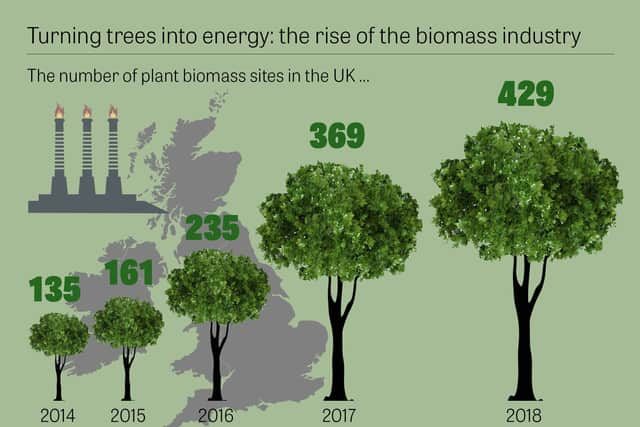Is burning trees for energy the answer to the climate crisis?


When people think of clean energy, wind turbines and solar panels often come to mind.
But another less well-known method of generating renewable electricity is booming across the UK and environmental campaigners have raised doubts about its green credentials.
Advertisement
Hide AdAdvertisement
Hide AdThe burning of trees or plant matter - known as plant biomass - now accounts for more than a fifth (21%) of the UK’s renewable energy, second only to wind power.


The number of plant biomass power plants in the UK has more than trebled in four years, from 135 in 2014 to 429 in 2018.
Between them, they now produce enough energy to power around 7.4 million homes, analysis by the JPIMedia Data Unit has found.
Unlike other forms of green energy, biomass produces greenhouse gases. Across the country, the rise in biomass means its total greenhouse gas emissions have nearly reached the amount produced by coal.
Advertisement
Hide AdAdvertisement
Hide AdThe industry says wood is sourced from renewable forests, with new trees being planted which store carbon and help to offset the emissions produced.


But with the environment proving a key policy battleground in this year’s General Election, campaigners are calling for the practice to come under more scrutiny.
‘No better than electricity from coal’
Katja Garson, forest and climate campaigner at European campaign group Fern, said: “It is very concerning that in the global push to reduce emissions, more is not being said about the climate impacts of harvesting and burning wood.”
Critics have also raised concerns that some power plants ship wood in from overseas, saying this has an added impact on the environment.
Advertisement
Hide AdAdvertisement
Hide Ad

JPIMedia analysis found plant biomass is now generating enough energy to power 7.4 million homes. Image: Shutterstock
The UK now imports 7.8 million tonnes of wood pellets a year, more than 20 times the amount imported a decade ago. Most comes from the USA and Canada, data from the Office for National Statistics shows.
Campaigners are urging the Government to rethink the £1.3 billion in annual subsidies that the biomass industry gets.
Almuth Ernsting, of the pressure group Biofuelwatch, said the Government should redirect subsidies to “genuinely low-carbon renewable energy” instead.
Advertisement
Hide AdAdvertisement
Hide Ad